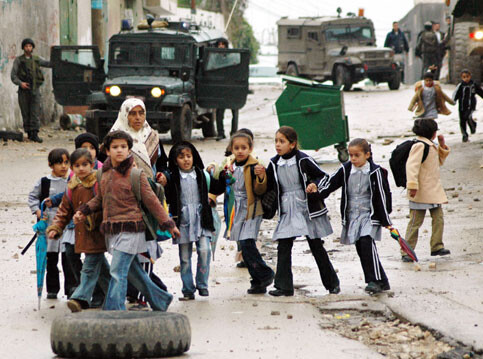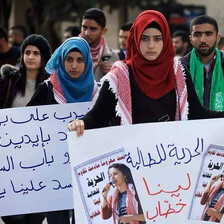
Schoolgirls in Al-Yamoun village near Jenin seek cover during an Israeli incursion 20 December 2005 (Mohamad Torkoman/MAAN)
One day before Valentine’s Day, ‘Annan’s father went to his 13-year-old son’s school in Beitunia, Ramallah, and only found his oldest boy’s jacket and backpack on the school grounds. Along with four other boys ranging from the ages of 11 to 14, ‘Annan had been arrested by Israeli soldiers who gave him a beating that was evidenced in the bruises seen by his parents when they were finally able to see him only briefly during ‘Annan’s 15-minute court hearing two days later. He told them that the soldiers beat him with their fists and feet, as well as the butts of their guns.
The day he was arrested with his friends, ‘Annan had come out of school after class to see an Israeli military jeep waiting out front. The military presence was suspicious, as there were no clashes happening in the area. But boys being boys, some began to pick up stones to throw at the vehicle. The Israeli soldiers, though heavily armed, called in reinforcements and approached the boys. Instead of running away, ‘Annan and his friends held their ground. Minutes later, they were detained.
The boys were taken to the Ofer military camp near Ramallah. After two days, ‘Annan was granted a hearing in the military court, where within 15 minutes ‘Annan was sentenced to a month in prison plus a 2,000 NIS (approximately $450 dollars) and over half of his family’s monthly income) fine without appeal — a routine sentence for Israeli military courts. In another hearing a few days later, ‘Annan was sternly warned that if he threw stones in the future, his sentence would be more weighty.
At the time of this writing, ‘Annan’s family has been denied access to visit the boy in prison, and they were only able to talk to him for a few minutes in the presence of Israeli guards during the court proceedings. After ‘Annan’s court date, the family didn’t know of their son’s whereabouts. They were told through intermediaries that ‘Annan had been transferred to the north of Israel, but not which detention center. In the West Bank, a large percentage of children arrested there are sent to Telmond, an overcrowded facility in the north of Israel where prisoners are denied medical services and subjected to solitary confinement. Other military detention camps, such as Ofer and Megiddo, are no less grim, since adults and children are housed together in large, rudimentary tents, in conditions that fail to meet the minimum standards of detention as stipulated by international human rights law.
‘Annan’s family endured several agonizing days as their lawyer attempted to establish contact with the boy. It was not until the Red Cross and a Palestinian prisoner support organisation stepped in that the family was able ascertain that they had been mislead by Israeli authorities—‘Annan was in Ofer the entire time.
Though relieved to know his whereabouts, ‘Annan’s family is fraught with uncertainty, not knowing what kind of treatment he has been subjected to, whether Israeli intelligence services have interrogated him, or worse, whether they have manipulated him — as they do with so many young boys — into becoming an informant. The experience has been particularly difficult for ‘Annan’s mother and younger siblings.
According to ‘Annan’s adult cousin, Lina, ‘Annan’s seven-year-old brother ‘Arar believes his brother “is a strong man” but she notices the fear in ‘Arar’s eyes, and how he is no longer able to maintain eye-contact. Five-year-old sister Dina says of ‘Annan, “I want him to come back.”
Like most Palestinians, ‘Annan’s family are no strangers to the Israeli prison system. Lina’s father and most of her uncles have served lengthy and legally dubious sentences in Israeli prisons, including the seven-year sentence for leading a village popular committee served by ‘Annan’s father. Political analysts have argued that during the 1987 intifada, popular committees were among the primary targets of Israel’s administrative detention policy. The harsh punishment Israel metes out on Palestinians in response to their political organisation is prevalent today, through such measures as the widespread detention of children and young men.
Meanwhile, the psychological effects of occupation and administrative detentions take a heavy toll on Palestinian society. Lina’s uncle has developed chronic shaking condition in his hands, which Lina attributes to the torture he endured in prison. UNICEF recently reported that signs of distress among Palestinian children, which include “bedwetting, nightmares, aggressive behavior… and low school achievement,” are increasing. In a 2003 survey of psychosocial needs, 93 percent of children reported feeling unsafe and vulnerable to attack, injury and other grave events, UNICEF’s website reports. However, for children in the formative years of adolescence, the effects of imprisonment are especially severe.
Defence for Children International-Palestine Section (DCI-PS) has studied the phenomenon of Israeli occupying forces arresting young children at checkpoints or for throwing stones, isolating them in prison, and using psychological abuse in order to blackmail or intimidate children into becoming informants for Israeli authorities. Given the stigma collaborators face in Palestinian society, children coerced into such activities are given little recourse for rehabilitation and counseling.
In a press release recently issued regarding the growing number of Palestinian children in Israeli detention, DCI-PS writes that upon arrest, during which beatings are common, “children are taken immediately for interrogation in which police and soldiers hurl abuse, threats and sometimes kicks and punches to extract some form of admission from the terrified child. Confessions obtained from this brutalising procedure, which contravenes every legal and moral guideline regarding the questioning of suspects, are deemed sufficient evidence by the Israeli military authorities not only to charge the child, but to charge others implicated in the confession.”
According to the UN Office of Humanitarian Assistance, there were 360 Palestinian children in Israeli detention during the month of February, up from 318 in November 2005. Last year, the average number of Palestinian children in Israeli detention during a given month was 300. Added to this is the trend towards longer sentences. “Every house in Palestine has a story like this,” Lina says wistfully, noting the lack of protection mechanisms for children’s rights in the Israeli system.
Indeed, several of ‘Annan’s rights as enshrined in the UN Convention on the Rights of the Child have been violated. Such rights include that against the subjection of torture or other cruel or degrading treatment or punishment; the unlawful or arbitrary deprivation of liberty; and in the event of detention — which should only be used as “a measure of last result and for the shortest appropriate period of time” — the right for the child to maintain contact with his or her family.
Lina explains that given her family’s history of Israeli detention, they are aware of the risks ‘Annan faces, and are thus ready to protect ‘Annan once he is released to ensure his well-being to the best of their ability. ‘Annan has a very strong support network to return to when he is freed. Her field being psychology, Lina is determined to “squeeze the feelings out of him” once ‘Annan comes home, so that he may cope with this trauma. But not all detained children are so lucky in this besieged society.
Related Links
Based in Ramallah, Maureen Clare Murphy is Arts, Music and Culture Editor for The Electronic Intifada. Zachary Wales is a masters student at Columbia University’s School of International and Public Affairs. He is also a co-founder of Labor for Palestine and studied Arabic at Birzeit University last summer.





